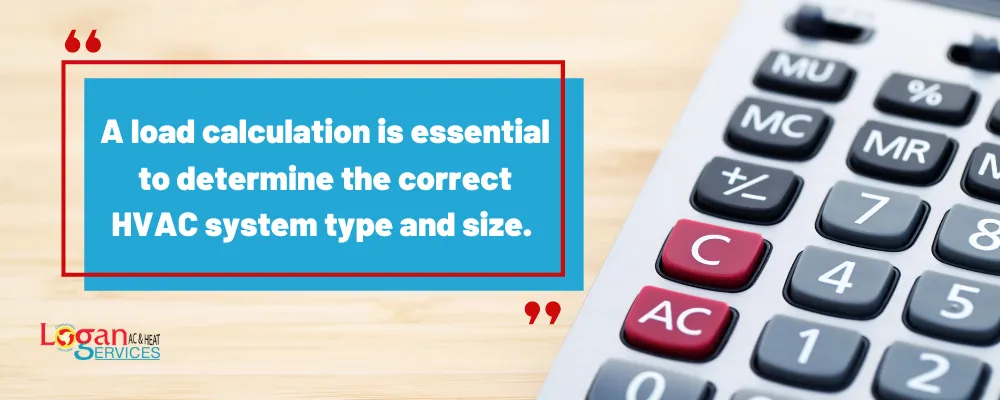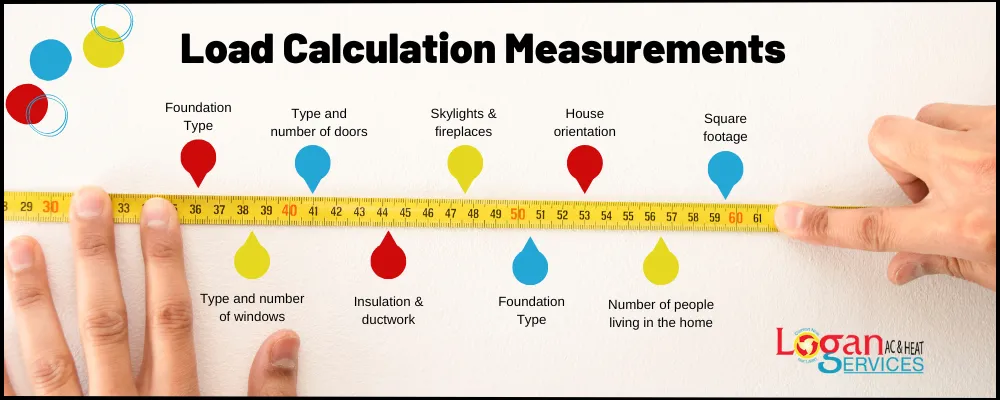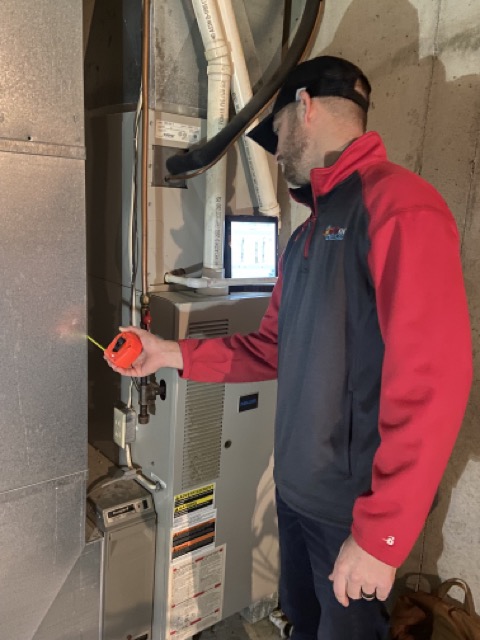At Logan Services our main priority is ensuring our customers are comfortable in their homes. This means finding the perfect HVAC system for your home, starting with determining the right sized equipment. To choose the best system combination for your comfort needs, we need to do a ton/load calculation.
A load calculation, also known as a “ton calculation,” is a well-known concept in the HVAC industry, is a method of computing heat gain and loss in your home. The result of your home’s AC ton calculation will help us to correctly size the heating and cooling equipment that will be best for your living space.
What is an AC Ton Calculator?
An AC ton calculator is a tool used to determine the appropriate size or capacity of an air conditioning unit (AC) for a given space. It calculates the required tonnage based on factors such as the square footage of the area, insulation levels, number of windows and doors, and the climate of the region. The tonnage refers to the amount of heat an AC can remove from the space in a one-hour period, and it typically ranges from 1 ton to 5 tons or more. Using an AC ton calculator helps ensure that the AC is properly sized for efficient and effective space cooling.

What Measurements We Take During A Detailed Load Calculation
When a Comfort Consultant comes to your home for a free in-home estimate, they will take specific measurements when looking at the existing heating and cooling system. Some of the measurements you will see us take that determine the correct size of HVAC equipment includes the following:
- Square footage of the home, along with home layout and ceiling heights
- Type of foundation
- Type and number of windows
- Type and number of doors
- Insulation & ductwork
- Skylights & fireplaces
- House orientation (the way the house faces – north, south, east and west)
- Number of people living in the home

Why A Load Calculation Is Important
Our team will do a thorough analysis of your home. A cooling load calculation is essential to determine the correct HVAC system type and size. When our Comfort Consultant takes measurements in your home, we will discuss your comfort concerns. Depending on the concerns you tell us about, it could point to under or oversized heating and cooling equipment. The wrong size of HVAC equipment can make you uncomfortable and may not allow your system to heat/cool your home adequately.

The Customer Benefits Of Load Calculation
The benefits of doing a load calculation in your home will ensure that we find the correct size of HVAC equipment to install to ensure your comfort. In addition, taking these measurements will help us understand what size of equipment is required to heat and cool your home correctly.
- Too small of an HVAC system will constantly run, increasing energy consumption.
- Too small of an air conditioner – the home won’t cool down properly
- Too small of a furnace – the home won’t warm up properly
- Too big of an HVAC system will shorten the life of your heating/cooling equipment and increase your utility bills.
- Too big of an air conditioner – won’t run long enough to remove humidity
- Too big of a furnace – will leave uneven temperatures
Units Of Measurement For HVAC Sizing
After we perform a proper load calculation, you will be informed of the sizing of equipment needed for your home. Those sizes will be shared with you in the form of BTUs (heating) and Tons (cooling).
Furnaces Are Sized Based On BTUs:
Your furnace size will be measured in BTUs (British Thermal Unit). The most common furnace BTU sizes include 60,000, 80,000, 100,000 and 120,000.
Air Conditioners Are Sized Based On Tonnage:
When it comes to your outside unit, whether you have an air conditioner or heat pump, your equipment will be measured in tons. Contrary to popular belief, the tonnage of your air conditioner has nothing to do with its weight. A ton is a term that describes how much heat the AC unit can remove from a home in one hour. Your load calculation will determine what air conditioner tonnage you require, which can range from 1.5 tons to 5 tons. To get an idea of what tonnage you require you can consult an AC tonnage chart.
If you are ready for HVAC replacement in your home, you can call our team of heating and cooling professionals. We will provide you with a free in-home estimate and make sure to find the perfect system for your home. Logan Services serves the Dayton, Columbus, and Cincinnati communities.
FAQs
How many sq ft will a 4 ton AC unit cool?
The cooling capacity of an AC unit is typically measured in British Thermal Units (BTUs) rather than square feet. However, a 4-ton AC unit is generally considered to have a cooling capacity of around 48,000 BTUs per hour. The actual square footage that it can cool will depend on several factors, such as insulation, ceiling height, number of windows, and climate conditions. As a rough estimate, a 4-ton AC unit can typically cool a space of around 1,600 to 2,400 square feet, but it is recommended to consult with a professional HVAC technician to determine the exact requirements for your specific space.
What is the rule of thumb for air conditioning size?
The rule of thumb for air conditioning size is to determine the cooling capacity based on the square footage of the room or space that needs to be cooled. Typically, it is recommended to have 20 BTUs (British Thermal Units) of cooling capacity per square foot. For example, a 500 square foot room would need an air conditioner with a cooling capacity of at least 10,000 BTUs. However, it is important to consider various factors such as insulation, ceiling height, and sun exposure, as they can affect the cooling requirements. It is advisable to consult with a professional HVAC technician to accurately determine the appropriate air conditioning size for your specific needs.
How many ton AC do I need for 2000 square feet?
The size of the air conditioner needed for a 2000 square foot space depends on various factors, including insulation, ceiling height, number of windows, and climate. Generally, a good rule of thumb is to allow for 20 BTUs (British Thermal Units) per square foot. Therefore, for a 2000 square foot area, a 40,000 BTU or 3.5-ton air conditioner should be sufficient. However, it is advisable to consult with an HVAC professional to accurately determine the appropriate tonnage for your specific needs.




















